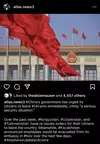- 13
- 34
"Centrists" seem to agree: https://old.reddit.com/r/centrist/comments/y366xe/analysis_voters_may_care_more_about_the_cost_of/
The House select committee investigating the US Capitol insurrection long ago dropped the notion of being a narrowly focused quest for the facts as members use their probe to try to defend democracy in its intensifying struggle with Donald Trump.
The panel returns to the public eye Thursday after its late-summer break with a televised hearing that sources tell CNN will serve as a pre-midterms warning that the ex-President is a clear and present danger to free elections.
But are the American people listening? And do the committee's efforts to undermine Trump's cadre of election denier candidates in 2022 and vow to ensure he never again tastes presidential power have any chance of success?
While there are scores of Republican nominees running for federal and state positions on a platform of Trump's lie that the 2020 was stolen, this year's tumultuous campaign is most notable for other issues that have overtaken the shockwaves of the assault on the Capitol only 21 months ago.
New Consumer Price Index data released on Thursday showed that inflation rose 8.2% in September year-on-year. By one measure, the cost-of-living index returned to its highest level since August 1982 last month. On a monthly basis, overall consumer prices increased by 0.4% from August.
Republicans are sketching a dystopian picture of a nation in the grip of a crime wave to try to turn the election into a referendum on President Joe Biden. While the President claimed Trump's "MAGA" fans had embraced "semi-fascism" and some Democratic campaigns have run ads warning of an autocratic GOP, Democrats are running far harder on the conservative Supreme Court majority's overturning of abortion rights and their new law trimming some prescription drug costs.
Polls repeatedly show that voters see the economy -- a far more visceral issue in daily life than the threat to American democracy -- as their top concern. Their anxiety was explained by the latest inflation data. Grocery bills are just a pain right now. Frozen potato products are up 10%, pork products that are not sausages are 5.5% more expensive, according to US Producer Price Index data released on Wednesday. While it would be too simplistic to say voters are more preoccupied with the cost of French fries than the price of democratic freedoms, it wouldn't be far from the mark.
New CNN/SSRS poll numbers published Thursday show that the economy and inflation are especially concerning to voters in competitive congressional districts. While 59% of registered voters nationwide call the economy extremely important to their vote, that rises to 67% in these districts. The share calling inflation that important rises from 56% to 64%.
An increasingly political committee
Given the increasingly strident warnings from committee members about the danger that Trump-backed candidates pose to democracy, it's hard not to see Thursday's January 6 hearing as an intervention in the midterms. And since Trump is already a hot favorite for the GOP's 2024 presidential nomination, warnings of committee members from both parties that he must never hold office again are by definition highly political.
Democratic Rep. Jamie Raskin, a member of the panel from Maryland, told CNN's Wolf Blitzer on Wednesday that the hearing would sound the alarm about Trump's continuing incitement and his pollution of the 2022 election with voter fraud falsehoods.
"There continue to be subtle calls for ... violence, things like saying, Mitch McConnell, the Senate Minority Leader has a death wish," Raskin said, referring to comments the former President made about the Kentucky Republican. "And the refusal of huge numbers of Trump-inspired candidates to accept the reality of Trump's defeat in 2020, when Joe Biden beat him by more than 7 million votes, 306 to 232 in the Electoral College," the Maryland lawmaker added.
"So the electoral denialism is rampant and there continue to be, you know, very scary intimations about embrace or tolerance of political violence."
The committee, of course, is about more than politics. It has built an investigative record for posterity. It has portrayed the attack on the Capitol in graphic terms. It has shown that many of those who stormed the Capitol did so in the belief they were acting on Trump's orders. Using testimony from brave Republicans who stood up to the ex-President, the committee has unpacked his relentless scheme to steal power. The probe has shown Trump made a deliberate choice not to intervene when his mob threatened the lives of lawmakers. And it has documented the fate of those like two former Georgia election workers who faced an onslaught from Trump partisans simply for their role in making sure the voice of the people was heard in the 2020 election.
And the impact of the committee's work could also unfold in the months and years ahead, especially if it factors into assessments of Trump's fitness for office in a possible 2024 general election campaign. The committee may already have played a critical role in shaping public opinion about January 6 in the event that the Justice Department ultimately decides to make indictments following its separate investigation into the events surrounding that day.
Judging the committee's impact outside Washington
But since committee members have portrayed their work in such political terms, it is also fair to consider its effectiveness as a political entity.
The panel's run of televised summer hearings was effective, and in their highly produced and prosecutorial style set a new precedent for how the formal theatrics of a congressional investigation could be modernized. Some of that momentum appears to have ebbed, however, over their late summer break. And there will need to be shocking new evidence and story lines on Thursday to make a major impact in the frenetic final days of the midterm election showdown.
But while the committee had transfixed Washington, there is little evidence to suggest that it has dominated conversations outside the capital, in a nation still struggling to shake off the deprivations of a once-in-a-century pandemic and coping with raging inflation and growing fears of a recession.
There has been no comparable national moment of shock and understanding that took place during the Senate Watergate hearings that opened in 1973 and held America spellbound. That might not be the committee's fault.
Given the fractured state of the media and the polarization of the country, shared national moments of catharsis are now rare. And tens of millions of voters have been convinced by Trump's false claims of election fraud that are pumped out around the clock by conservative media. So, many minds were certain to remain closed, however darning the committee's findings. That is the nature of modern US politics.
Cheney's warning as Trump gears up for 2024
The most striking example of this can be seen in the wreckage of Rep. Liz Cheney's congressional career. The committee's vice chair knew she was sacrificing her role near the top of the GOP with her outspoken criticism of Trump over his assault on democracy, having already lost her leadership position in the House Republican conference over it.
But she also failed to convince Republican voters back home in Wyoming that the threat to American democracy was the biggest concern. She lost her primary by a landslide to a Trump-backed rival, underscoring that in most of the Republican Party, there is no market for a message that Trump represents a mortal threat to free elections.
Still, Cheney is promising she's hardly started and is committed to opposing any White House run by the former President, who continues to flirt with incitement at his raucous rallies.
"I think that what you've seen consistently and increasingly is Donald Trump continuing to suggest and to say the same things that we know caused violence on January 6," Cheney told CNN.
Some Democrats have used the shenanigans that followed the 2020 election to slam their Republican opponents. Nevada Sen. Catherine Cortez Masto, who's widely seen as the most vulnerable Democrat in the Senate, accused GOP opponent Adam Laxalt of being "the face of Donald Trump's campaign to overturn Nevada's election results" in one recent spot. And a Democratic Congressional Campaign Committee ad in North Carolina's competitive 13th Congressional District blasts Republican nominee Bo Hines for saying the 2020 election was stolen from Trump and for siding with him on defunding the FBI.
But the economy remains the driving force in the midterms. In a new CNN/SSRS poll released on Wednesday, Biden's approval rating did tick up -- to 44%. But only 36% of US adults approved of his handling of the economy. And a bare 32% were happy with the way the President is tackling inflation.
Inflation is such a pernicious force -- especially in the way it drains the finances of those who can least afford it and is felt in every aspect of daily life -- so it's not surprising it's at the forefront of voters' minds as the election looms.
But the difficulty that democracy proponents have had in turning their fight into a defining political issue -- at least in these midterm elections -- underscores the findings of experts who have studied the rise of authoritarian societies abroad. Often, voters only realize that their democracy is dying is when it's too late.
https://edition.cnn.com/2022/10/13/politics/midterms-january-6-hearing-inflation-analysis/index.html
- 7
- 6
https://www.dailymail.co.uk/news/article-11315675/Russian-using-r*pe-weapon-war-Ukraine-says.html

https://old.reddit.com/r/news/comments/y4mrrt/russia_using_rape_as_military_strategy_in_ukraine/
https://old.reddit.com/r/TimPool/comments/y4tbmv/russia_using_rape_as_military_strategy_in_ukraine/

https://x.com/mbk_center/status/1581011742989365248#m
https://x.com/CNN/status/1581259206027808773#m
https://x.com/thehill/status/1581330580083707906#m
https://x.com/cnni/status/1581251432447356934#m

https://archived.moe/pol/thread/399977141
Russia using r*pe as 'military strategy' in Ukraine: UN envoy | CNN
Russia is using r*pe and sexual violence as part of its “military strategy” in Ukraine, a UN envoy said this week.
The claim follows data released by a panel of UN experts recently that verified “more than a hundred cases” of r*pe or sexual assault incidents reported in Ukraine since February.
“When you hear women testify about Russian soldiers equipped with Viagra, it’s clearly a military strategy,” Pramila Patten, UN Special Representative on Sexual Violence in Conflict, said in an interview with AFP on Thursday.
Experts document alleged crimes against humanity committed by Russian forces in Ukraine
“There are many cases of sexual violence against children who are r*ped, tortured and sequestered,” Patten said.
“I have not stopped since February to emphasize the importance of having credible investigations into these cases of violence.
Since the Russian invasion began, Ukrainian officials have repeatedly accused Moscow’s forces of sexually abusing women and children, claiming they are using r*pe and other sexual acts as weapons of war.
- 1
- 3
- 4
- 19
Peter Thiel is far from the first billionaire who has wielded his fortune to try to influence the course of American politics. But in an election year when democracy itself is said to be on the ballot, he stands out for assailing a longstanding governing system that he has described as “deranged” and in urgent need of “course correction”.
The German-born investor and tech entrepreneur, a Silicon Valley “disrupter” who helped found PayPal alongside Elon Musk and made his fortune as one of the earliest investors in Facebook, has catapulted himself into the top ranks of the mega-donor class by pouring close to $30m into this year’s midterm elections.
He’s not merely favoring one party over another, but is supporting candidates who deny the legitimacy of Joe Biden’s election as president and have, in their different ways, called for the pillars of the American establishment to be toppled entirely.
Thiel’s priorities this midterm cycle have partly aligned with those of Donald Trump, with whom he has had an on-again, off-again relationship since writing him a $1.25m check during the 2016 presidential campaign.
Thiel, like Trump, has made it his business to end the careers of what he calls “the traitorous 10”, Republican House members who voted to impeach Trump in the wake of the January 6 insurrection. Four of these members opted not to run for re-election at all, and four more, including Liz Cheney, the vice-chair of the House committee investigating January 6, went down in the primaries.
But there are also signs that Thiel is thinking around and beyond the former president. The lion’s share of his largesse – $28m and counting – has been directed towards two business proteges who, with his help, have established themselves as gadfly rightwing darlings: JD Vance, the best-selling author of the blue-collar memoir Hillbilly Elegy, who is running for Senate in Ohio, and Blake Masters, a self-styled “anti-progressive” and anti-globalist who is running for Senate in Arizona.
Over the past decade, ever since the supreme court dramatically loosened the rules of political campaign giving in its Citizens United decision, Thiel has placed sizable bets on candidates who are not only conservative but have sought to challenge longstanding institutional traditions and break the Republican party’s own norms: Senator Ted Cruz in Texas and Senator Josh Hawley in Missouri as well as Trump himself.
Masters, who has campaigned on the notion that “psychopaths are running the country right now” and spoken approvingly of the anti-establishment philosophy of the 1990s Unabomber, and Vance, a frequent speaker on the university circuit during his book tour days who now says “universities are the enemy”, fit the same mould. They and Thiel all have ties to a branch of the New Right known as NatCon, whose adherents believe, broadly, that the establishment needs to be torn down, much as Thiel and his fellow Silicon Valley disrupters believed two decades ago that the future lay in destroying longstanding business models and practices.
Thiel himself opined as far back as 2009 that he no longer believed democracy to be compatible with freedom and expressed “little hope that voting will make things better”. While a member of Trump’s presidential transition team in 2016, he flashed his institution-busting instincts by proposing that a leading climate change skeptic, William Happer, be appointed as White House science adviser. He also pushed for a libertarian bitcoin entrepreneur who did not believe in drug trials to head up the Food and Drug Administration.
Such proposals were too much even by Trump’s iconoclastic standards. Steve Bannon, Trump’s ultra-right campaign manager and political strategist, told a Thiel biographer: “Peter’s idea of disrupting government is out there.”
Thiel did not respond to a request for an interview, and his representatives did not respond to multiple invitations to comment.
Masters and Vance also did not respond to inquiries.
Democracy under attack: the mega-donors
Thiel sat out the 2020 election but appears to have been re-energized by the Covid-19 pandemic, Trump’s claims of a stolen presidential election and the January 6 insurrection. Addressing a NatCon convention this time last year, he denounced the “incredible derangement of various forms of thought, political life, scientific life and the sense-making machinery generally in this country”.
Liberal democracy, in his view, had turned the United States government into a dissent-squashing Ministry of Truth working toward a “homogenizing, brain-dead, one-world state” – a problem to which only rightwing nationalism could provide an “all-important corrective”.
“We’re close to a Toto moment, a little dog pulling aside the curtain on the holy of holies only to find there’s nobody there,” he told the crowd. “We always think of democracy as a good thing. But … where do you shift from the wisdom of crowds to the madness of crowds? When does it become a mob, a racket, a totalitarian lie?”
Such views might be easy to write off as the eccentricities of a wealthy man but for the money that Thiel has spent buying influence and supporting like-minded candidates – thanks in large part to a campaign financing system that, while still capping contributions to individual campaigns, allows unlimited funding of nominally outside groups and political action committees.
Campaign finance experts see Thiel as a symptom of a much broader problem: a political environment in which a small group of mega-donors are growing ever bolder in the size of the checks they write and the erosion of any nominal firewall between the war chests run by candidates and the funds controlled by outside groups dedicated to their success.
“It does seem to be getting worse,” said Chisun Lee, an expert on campaign finance who directs the Brennan Center’s Elections and Government program at New York University. “Outside spending in this federal midterm cycle is more than double the last midterm cycle. Since Citizens United, just 12 mega-donors, eight of them billionaires, have paid one dollar out of every 13 spent in federal elections. And now we’re seeing a troubling new trend … that some mega-donors are sponsoring campaigns that attack the fundamentals of democracy itself.”
Thiel’s spending has been dwarfed this year by at least three other mega-donors – Soros ($128m to the Democrats), shipping products tycoon Richard Uihlein ($53m to Republicans) and hedge fund manager Kenneth Griffin ($50m to Republicans). And Thiel has some way to go to match the consistent giving, cycle after cycle, of the Koch brothers or Sheldon Adelson, the late Las Vegas casino magnate.
Many experts also believe the attack on democracy began long before it became as explicit as Thiel has made it, because the whole point of funneling large amounts of money into the political system is to sway policy away from the will of the majority to the narrow interests of the donors and their friends.
This ability to control the policy agenda drives spending even more than the desire to see specific candidates win, says the Harvard law professor Lawrence Lessig, whose 2011 book Republic, Lost offers an enduringly devastating analysis of the relationship between money and political influence. And the spending is likely only to increase.
“You’re going to see much, much bigger individual contributions and an acceleration of contributions to Super Pacs [like the ones established to support Vance and Masters],” Lessig said. “The candidates and the Super Pacs can’t coordinate on spending, but that doesn’t mean they can’t coordinate on the fundraising. Since the Super Pacs are outspending candidates by orders of magnitude, it’s all a dance to flush money into Super Pacs … They basically call the shots, and politicians can’t get anything through that they oppose.”
Less than a month from election day, both Vance and Masters are trailing their Democratic opponents in the polls (Vance by less than Masters). But, Lessig says, it would be wrong to conclude Thiel – or any of the other mega-donors – are wasting their money.
“If you’re a candidate and you know $10m is going to come in against you on a particular issue,” he said, “you are going to bend to avoid the effect of that money, whether or not it’s going to decide the race … If you’re someone who would otherwise be a strong climate activist, but you know that if you mention a carbon tax, a million dollars will drop from some anti-carbon tax Super Pac, you won’t talk about it.”
Thiel’s bid to overthrow the system, in other words, goes well beyond his ability to determine which party controls the Senate next year. The money will solidify the notion that the country is being run by psychopaths, at least among a hard core of Republican voters, analysts warn, and will further harden the ideological battle lines that have split the country in two and made common ground ever harder to find. It also brings the extreme opinions of NatCon further into the mainstream, making it easier for radical Republican candidates to run and win in future races, they say.
“We are at a crisis point here, not so much because the ideas are hard to defeat but we don’t have a context in which to defeat them,” Lessig said. “The fact that the same number of people believe the election was stolen as believed it on 6 January is a profound indictment of the information ecology in America.”
The Brennan Center believes there are ways of improving the system, at least at the state and local level, and points to efforts in both red and blue states to close certain loopholes and introduce public financing models to rein in the influence of the mega-donors. Lee said she would also like to see federal legislation to build a meaningful firewall between campaign funds and Super Pacs.
“The legislation exists,” she said, “and it would be a constitutional improvement even under [the] Citizens United [ruling]. All we need is the political will to act.”
- 6
- 12

https://old.reddit.com/r/argentina/comments/y4qhr6/turning_to_garbage_dumps_to_survive_argentines/
Turning to garbage dumps to survive, Argentines feel the pain of 100% inflation | Reuters
By Lucila Sigal
BUENOS AIRES, Oct 13 - Argentines facing an inflation rate set to top 100% this year are grappling to survive, turning to recycling from garbage dumps or lining up to trade their belongings in barter clubs. «My income is no longer enough,» said Sergio Omar, who spends 12 hours a day trawling through mountains of waste from a landfill in Lujan, 65 kilometers outside capital Buenos Aires, in search of cardboard, plastic and metal which he sells. At the dump, Reuters saw men and women searching for usable clothing and even food, wading through piles of rubbish where gas given off by the decomposing waste created sudden fires. But in recent years it has slid from one economic crisis to another and has struggled to keep inflation in check.
- 26
- 41
Making my monthly grayzone post ahead of the normal schedule, with the hope that the seethe generated will grant @MenAreWorst enough energy to healmaxxxx

@BeauBiden
@Soren
@Absinthe
@GigaVaccinator
@SucksCheedAndMourningInc
@TelegramShill @<the sexy Indian dudes: Salvador and the one whose name I can't spell someone else do needful and ping them pls> discuss
- 2
- 14
Good for them, assuming they're keeping the US in the dark, as well.
- 4
- 15
Bitten by inflation, workers are demanding a greater share of the surging profits of energy giants. It's the kind of unrest leaders fear as they struggle to keep a united front against Russia.
LE HAVRE, France --- The northern port city of Le Havre is less than 25 miles away from two major oil refineries. But on Friday, the pumps at many gas stations were wrapped in red and white tape, the electric price signs flashing all nines. Little gasoline was to be had.
Across France, a third of stations are fully or partly dry, victims of a fast-widening strike that has spread to most of the country's major refineries, as well as some nuclear plants and railways, offering a preview of a winter of discontent as inflation and energy shortages threaten to undercut Europe's stability and its united front against Russia for its war in Ukraine.
At the very least the strike --- pitting refinery workers seeking a greater share of the surging profits against the oil giants TotalEnergies and Exxon Mobil --- has already emerged as the first major social crisis of Emmanuel Macron's second term as president, as calls grow for a general strike next Tuesday.
"It's going to become a general strike. You will see," said Julien Lemmonier, 77, a retired factory worker stepping out of the supermarket in Le Havre on a gray and rainy morning. He warned that if the port workers followed suit, "It will be over."
The widening social unrest is just what European leaders fear as inflation hits its highest level in decades, driven in part by snarls in post-pandemic global supply chains, but also by the mounting impact of the tit-for-tat economic battle between Europe and Russia over its invasion of Ukraine.
Economic anxiety is palpable across Europe, driving large protests in Prague, Britain's biggest railway strike in three decades, as well as walkouts by bus drivers, call center employees and criminal defense lawyers, and causing many governments to introduce relief measures to cushion the blow and ward off still more turbulence. Airline workers in Spain and Germany went on strike recently, demanding wage increases to reflect the rising cost of living.
For France the strikes have touched a long-worn nerve of the growing disparity between the wealthy few and the growing struggling classes, as well as the gnawing worry about making ends meet in the cold winter ahead.
Workers at half of the country's eight refineries are continuing to picket for higher wages in line with inflation, as well as a cut of the sky-high profits their companies made over recent months, as the price of gasoline has surged.
"The money exists, and it should be distributed," said Pascal Morel, the regional head of Confédération Générale du Travail, or CGT, France's second-largest union, which has been leading the strikes. "Rather than laying claim to the striking workers, we should lay claim to their profits."
Slow to notice at first, the country was rudely awoken to the strike's effect this week, when pumps across the country ran out of fuel, forcing frustrated motorists to hunt around and then line up --- sometimes for hours --- at stations that were still open. Nerves quickly frayed, and reports of fistfights between enraged drivers buzzed on the news.
In Le Havre, as in the rest of the country, residents revealed mixed feelings about the strikes. Some expressed solidarity with the workers, while others complained about how a small group was holding the entire country hostage. On both sides of the divide, however, many feared the strike would spread.
"It's going to bring France to a standstill and I assure you it doesn't need that," said Fatma Zekri, 54, an out-of-work accountant.
On Thursday, workers echoed the call for a general strike next Tuesday originally issued by the CGT and later supported by three other large unions. And a long-planned protest by left-wing parties over the rising cost of living scheduled for Sunday threatens to become even larger.
For Mr. Macron, the strike holds obvious perils, with echoes of the social unrest of the Yellow Vest movement --- a widespread series of protests that started as a revolt against higher taxes on fuel. The movement may have dissipated, but its anger has not.
The protests paralyzed France for months in 2018 and 2019, led by lower-middle class workers who took to the streets and roundabouts, raging against a climate change tax on gas that they felt was an insulting symbol of how little the government cared about them and their sliding quality of life.
The current strikes illustrated a longstanding question that continues to torment many in the country, said Bruno Cautrès, a political analyst at the Center for Political Research at Sciences Po University --- "Why do I live in a country that is rich and I am struggling?"
Speaking of the president, Mr. Cautrès said, "He has not managed to answer this simple question."
After winning his re-election last April, Mr. Macron promised he would shed his reputation as a top-down ruler and govern the country in a more collaborative way.
"The main risk is that he will not succeed in convincing people that the second term is dedicated to dialogue, to easing tensions," Mr. Cautrès said.
But even as he faced criticism that his government had allowed the crisis to get to this point, Mr. Macron sounded defiant on Wednesday night, saying in an interview with the French television channel France 2 that it was "not up to the president of the republic to negotiate with businesses."
His government has already forced some workers back to a refinery near Le Havre and a depot near Dunkirk.
"I can't believe that for one second, our ability to heat our homes, light our homes and go to the gas pump would be put at risk by French people who say, 'No, to protect my interests, I will compromise those of the nation,'" he said.
Still, Mr. Macron is treading a very fine line. The issue of "super profits" has become a charged one in Parliament, with opposition lawmakers from both the left and right demanding companies reaping windfalls be taxed, to benefit the greater population.
Over the first half of the year, TotalEnergies made $10 billion in profit and Exxon Mobil raked in $18 billion. Western oil and gas companies have generated record profits thanks to booming energy prices, which have risen because of the war in Ukraine and allowed Russia to rake in billions in revenues even as it cuts oil and gas supplies to Europe. A recent OPEC Plus deal involving Saudi Arabia and Russia to cut production is likely to further raise prices.
Earlier this week, Exxon Mobil announced that it had come to an agreement with two of four unions working at its sites, "out of a desire to urgently and responsibly to put an end to the strikes." But the wage increase was one percentage point less, and half the bonus, that CGT had demanded.
In its own news release, TotalEnergies said the company continued to aim for "fair compensation for the employees" and to ensure they benefited "from the exceptional results generated" by the company.
On Friday, two unions at TotalEnergies announced they had reached a deal for a 7 percent wage increase and a bonus. But CGT, which has demanded a 10 percent hike, walked out of the negotiation and said it would continue the strike.
To date, Mr. Macron has been loath to tax the oil giants' windfall profits, worrying it would tarnish the country's investment appeal, and preferring instead that companies make what he termed a "contribution."
However, last week the government introduced an amendment to its finance bill, in keeping with new European Union measures, applying a temporary tax on oil, gas and coal producers that make 20 percent more in profit on their French operations than they did during recent years.
On Thursday, France's Finance Minister Bruno Le Maire also called on TotalEnergies to raise wages for salaried workers. And he announced that 1.7 billion euros, about $1.65 billion, would be earmarked to help motorists if fuel prices continued to rise.
"It is a company that is now making significant profits," Mr. Le Maire told RTL radio station on Thursday. "Total has paid dividends, so the sharing of value in France must be fair."
The tangle of pipes and towering smokestacks of the hulking Total refinery in Gonfreville-l'Orcher, just outside of Le Havre, were eerily silent on Thursday, as union members burned wood palettes, hoisted flags and voted to continue the strike.
Many believed their anger captured a building sentiment in the country, where even with generous government subsidies, people are struggling financially and are increasingly anxious about the winter of energy cutbacks. Inflation in France, though lower than in the rest of Europe, has surpassed 6 percent, jacking the prices of some basic supplies like frozen meat, pasta and tissues.
"This era must end --- the era of hogging for some, and rationing for others," François Ruffin told the protesters on Thursday. Mr. Ruffin, a filmmaker turned elected official with the country's hard-left France Unbowed party, rose to prominence with his satirical documentary film about France's richest man, Bernard Arnault, and the loss of middle-class jobs to globalization.
If anything should be requisitioned, it should be the profits of huge companies, not workers, many said at the protest sites.
David Guillemard, a striker who has worked at the Total refinery for 22 years, said the back-to-work order had kicked a hornet's nest. "Instead of calming people," he said, "this has irritated them."
- 3
- 6
https://old.reddit.com/r/ukpolitics/comments/y3riip/kwasi_kwarteng_sacked_as_chancellor_after/
https://old.reddit.com/r/ukpolitics/comments/y3rrbc/nicholas_watt_bbc_a_group_of_senior_tories_have/
https://x.com/nicholaswatt/status/1580887374292455424
A group of senior Tories have been holding discussions + have decided the following: the sacking of @KwasiKwarteng will prompt them to come out publicly next week + call on @trussliz to resign. My source: “These are serious people. The PM will find it difficult to survive.”
More live updates here https://www.bbc.com/news/live/uk-politics-63221738
- 2
- 22
It makes sense. Russia is using 1980s weapons. Why not counter them with the improved HAWK which was our counter for them in the 1980s. It's a missile that doesn't get enough love but reading from declassified journals on both sides of the Iron Curtain, NATO was building its defenses around it and the Soviets considered it to be a huge problem. And we know it must have been useful in the Iran-Iraq War because it was one of the items the Iranians wanted in Iran-Contra.
Remember when Ted Postol claimed in 1991 that it's impossible to shoot down Russian missiles so we shouldn't even try? What ever happened to that guy anyway... 
- 6
- 17

https://old.reddit.com/r/news/comments/y3ckrc/multiple_people_shot_raleigh_police_on_scene_of/

https://x.com/TheInsiderPaper/status/1580676942541385728#m
https://x.com/CNN/status/1580731475107803136#m
https://x.com/nytimes/status/1580782975633223680#m
https://x.com/Phil_Lewis_/status/1580757389111750656#m
https://x.com/notcapnamerica/status/1580756449168216064#m
North Carolina shooting leaves 5 dead, including off-duty police officer; suspect in custody
Five people are dead and two others are injured after a shooting in Raleigh, North Carolina, on Thursday afternoon.
Speaking in a second press conference shortly before 11 p.m. ET, authorities said one patient had been released from the hospital and the other is critical condition.
"We need to support those in our community who have suffered a terrible loss, a loss of a loved one.
I just want to thank the extraordinary officers of the Raleigh Police Department, who even now, right now, are protecting us and putting themselves in harm's way to arrest the suspect," Baldwin said during the press conference.
Fox News Digital has reached out to North Carolina authorities.
State and local officers are on the ground and working to stop the shooter and keep people safe," Cooper said.
- 6
- 17
JUST IN - North Korea fired 170 artillery shells into the "buffer zone," violating the 2018 inter-Korean agreement, South Korea's military says.
— Disclose.tv (@disclosetv) October 13, 2022

https://old.reddit.com/r/NonCredibleDefense/comments/y3ehtc/new_war_just_started/
https://old.reddit.com/r/korea/comments/y3eiud/breaking_north_korea_fires_130_artillery_shells/
- 5
- 18

https://old.reddit.com/r/news/comments/y3238z/parkland_shooter_to_get_life_sentence_for_killing/
https://old.reddit.com/r/walkaway/comments/y3302v/parkland_shooter_avoids_the_death_sentence/
https://old.reddit.com/r/law/comments/y3208x/parkland_school_shooter_sentencing_jury_decides/

https://rdrama.net/post/112938/im-feeling-defeated-after-listening-to

https://communities.win/c/TheDonald/p/15K6JT04sV/just-in--jury-recommends-the-dea/c

- 3
- 21
The Biden administration said Thursday that the COVID-19 public health emergency will continue through Jan. 11 as officials brace for a spike in cases this winter.
The decision comes as the pandemic has faded from the forefront of many people's minds. Daily deaths and infections are dropping and people --- many of them maskless --- are returning to schools, work and grocery stores as normal.
The public health emergency, first declared in January 2020 and renewed every 90 days since, has dramatically changed how health services are delivered.
The declaration enabled the emergency authorization of COVID vaccines, testing and treatments for free. It expanded Medicaid coverage to millions of people, many of whom who will risk losing that coverage once the emergency ends. It temporarily opened up telehealth access for Medicare recipients, enabling doctors to collect the same rates for those visits and encouraging health networks to adopt telehealth technology.
Since the beginning of this year, Republicans have pressed the administration to end the public health emergency. President Joe Biden, meanwhile, has urged Congress to provide billions more in aid to pay for COVID-19 vaccines and testing. The federal government ceased sending free COVID-19 tests in the mail last month, saying it had run out of money.
Public health officials are urging people age 5 and older to get an updated COVID-19 booster alongside a flu vaccine this fall before a predicted winter coronavirus surge and a nasty flu season. As of last weekend, about 13 million people had gotten the updated booster, which targets the omicron variant, according to White House COVID-19 coordinator Dr. Ashish Jha.
The administration has said it would provide 60 days notice before it ends the public health emergency.
- 2
- 15
- 5
- 25
- 2
- 8
- 1
- 6
God Bless America
- 4
- 17
8.2%, which is 0.1% higher than predicted
/biz/ reacts --> https://archived.moe/biz/catalog
Consensus is moderately bearish. Crypto dumped twice but seems to be recovering now. The more significant news is that inflation sticks despite the Fed's efforts. Keeping in mind that the US petroleum subsidies end soon, either next month or the month after portends a CPI doomp of epic proportions.
- 9
- 27
Los Angeles mayoral candidate Rick Caruso declares he's not white because he's Italian
The billionaire added his Italian American heritage makes him “Latin,” sparking a social media uproar.

Los Angeles mayoral candidate Rick Caruso insisted he's not white but really Italian — and thus "Latin" — in an awkward debate moment Tuesday in the country's second-largest city.
Caruso, a billionaire real estate developer, faces U.S. Rep. Karen Bass, a Democrat seeking to become the city's first Black female mayor.
Next month's election comes in the wake of former City Council President Nury Martinez’s resignation from her council seat Wednesday after an audio recording of her making racist remarks surfaced.
Image: Los Angeles Mayoral Candidate Rick J. Caruso Hosts Forum At Emerson College
Los Angeles mayoral candidate Rick Caruso speaks Friday at Emerson College Los Angeles.Amy Sussman / Getty Images
In bringing up the scandal, Telemundo anchor Dunia Elvir said: “The next mayor of Los Angeles will be either an African American woman or a white man."
“I’m Italian,” Caruso interjected.
Elvir responded, “Italian American," as Caruso insisted that his racial identification be stated on his terms.
“That’s ‘Latin,’ thank you,” Caruso said.
Caruso said he has for decades led efforts to bring more education opportunities and health care to Black and Latinx communities in Los Angeles.
"I connect with the Latinx community, but quite frankly my job as mayor is to connect with every community — the Latinx community, the Black community, the Asian community, right? The Jewish community," said Caruso, who is running as a Democrat.
"If one group rises, we all rise. We do this together in unison, and we don't separate, we don't divide. But we all say to ourselves we can do this and we can have a better city."
Caruso's "Latin" identity comment drew a harsh reaction, from scorn to mockery.
"Wow, did Caruso just say he is Latin? That he is not a white man?" community activist Alberto Retana tweeted Tuesday night. "I am floored. We cannot let him do this. Terrible."
Comedy writer Nick Jack Pappas cracked that Caruso has as much connection to Latin Americans as Christopher Columbus.
"Can’t wait for Rick Caruso to claim Columbus was a Latinx immigrant," he tweeted.
The Los Angeles Times reported Sunday that it had obtained 2021 audio from a political strategy meeting in which Martinez and City Council member Kevin De León used racist slurs to refer to council member Mike Bonin’s young son, who is Black. Bonin is white.
Martinez stepped down as president of the City Council on Monday and took a leave of absence from the council before she announced her resignation Wednesday.
Los Angeles is home to nearly 3.9 million residents, 48.1% percent of whom identify as Latinx or Latinx, 28.5% as non-Latinx or Latinx white, 11.8% as Asian and 8.8% as Black.
Caruso appeared to be hanging his "Latin" hat on cultural terms used outside the U.S., said Mark Hugo Lopez, the director of race and ethnicity research at the Pew Research Center.
"'Latin' is something in southern Europe. You'll hear people refer to themselves as 'Latins,' and that includes people who are Spanish, Portuguese, French and Italians," Lopez said Wednesday.
But in common American parlance, "Latin" generally refers to people who can trace their lineage to Latin American countries.
"'Latinx' and 'Latin American,' those are really U.S.-based terms that have specific meanings, and it refers to people from Latin America," Lopez said.
David K. Li is a breaking news reporter for NBC News.
Now playing: Seashore War (Tropical Freeze).mp3















 nukecels… it’s coming
nukecels… it’s coming













 Russia using r*pe as 'military strategy' in Ukraine: UN envoy
Russia using r*pe as 'military strategy' in Ukraine: UN envoy 



















 news, the new Chancellor of the Exchequer (treasury minister in normal tongue) has been fired 2 weeks
news, the new Chancellor of the Exchequer (treasury minister in normal tongue) has been fired 2 weeks  into the job. Now "serious people" are saying that PM Liz Truss will be asked to resign next week
into the job. Now "serious people" are saying that PM Liz Truss will be asked to resign next week

 Trans ppl stay winning as Ohio activists quash an anti-trans resolution in major victory for trans rights
Trans ppl stay winning as Ohio activists quash an anti-trans resolution in major victory for trans rights 



 technology
technology

 Westoids may not like it, but chinese do
Westoids may not like it, but chinese do 

 RALEIGH RAMPAGE: Yet another shooting as Police say juvenile arrested in shooting that left 5 dead, including off-duty cop
RALEIGH RAMPAGE: Yet another shooting as Police say juvenile arrested in shooting that left 5 dead, including off-duty cop 

 North Korea fired 170 artillery shells into the "buffer zone," violating the 2018 inter-Korean agreement. Korean War 2.0 is on the menu!
North Korea fired 170 artillery shells into the "buffer zone," violating the 2018 inter-Korean agreement. Korean War 2.0 is on the menu! 














](/images/166566469506757.webp)






